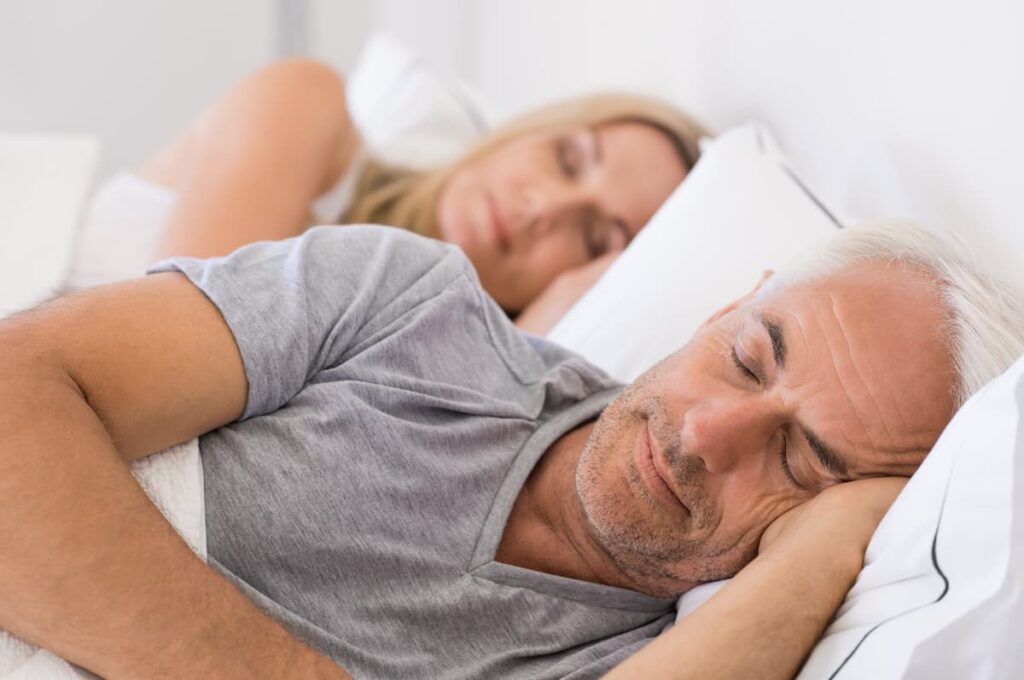Trying to get enough sleep can be a nightly battle for older adults, even when they’re not experiencing health issues. And if that wasn’t hard enough, certain medical conditions can make it even more challenging.
With age, many people contend with issues like arthritis, respiratory problems, and cognitive decline, all of which can significantly impact the ability to enjoy restorative shut-eye.

Thankfully, there are ways to win this fight—The Abbey at Westminster Plaza caregiving team understands what causes insomnia in the elderly. We focus on helping our residents sleep more soundly and are glad to share some of the most effective ways to help them drift off to slumberland.
But first, we’ll explain how certain medical conditions* make it harder to get in those eight hours.
The Relationship Between Medical Conditions, Seniors, and Sleep
Do seniors need less sleep? Typically, no, but their sleep patterns can change over time. They might be able to drift off, but staying asleep is another thing. That means shorter rest periods and less restorative sleep. While the recommended hours remain at around seven to eight, quality matters more than quantity for seniors to feel refreshed and energized.
Ultimately, understanding how certain factors intertwine with sleep can help adult children take appropriate steps for their loved ones. The following medical conditions can cause significant sleep disruptions:
Arthritis
For seniors dealing with arthritis, the persistent aches and pains can hinder their ability to find a comfortable sleeping position. That often leads to restlessness, making seniors wake up frequently throughout the night.
Respiratory Conditions
Respiratory conditions, including asthma, sleep apnea, and chronic obstructive pulmonary disease (COPD), pose their own set of problems. These conditions can lead to breathing difficulties that disturb sleep patterns. Seniors may suffer from obstructed airways or sudden episodes of breathlessness, creating anxiety around sleeping.
Dementia
Cognitive issues such as dementia can also cause senior insomnia. Dementia affects the brain regions responsible for regulating sleep-wake cycles. As a result, seniors may experience considerable nighttime wakefulness.
Practical Sleep Aids for Seniors
The following options can be quite helpful for seniors struggling to fall and stay asleep.
- White Noise Machines: These have been around for decades and can be separate units or on phone apps. Many seniors find that the soothing sound masks other noises, providing a more serene sleeping environment. They can also experiment with other ambient sounds, like rain and crashing ocean waves.
- Mattresses for Seniors: Choosing the best mattress for arthritis can significantly improve sleep quality. Look for ones that offer good support and pressure relief. Memory foam mattresses often provide the best combination of comfort and support, contouring to the body without putting too much pressure on sore joints.
- Bed Frames: Adjustable bed frames can also allow seniors to find the most comfortable sleeping position, reducing pain associated with arthritis or respiratory issues.
- Bed Linens: If a new mattress or frame is not an option, consider investing in high-quality bed linens and pillows that offer adequate neck and back support. Familiar items like a favorite blanket or stuffed animal can also promote better rest.
- Blackout Curtains: These window treatments block out light and darken rooms to encourage sleep.
How The Abbey at Westminster Plaza Supports Restful Sleep
Being in the right kind of senior apartment can significantly reduce sleep disturbances. The environment at The Abbey at Westminster Plaza promotes relaxation, from soothing colors to well-ventilated spaces that support better respiratory outcomes.
We have three lifestyle options, each with its own floor plans:
Additionally, our team pays attention to individual needs, understanding that some seniors may require specific arrangements to combat insomnia in the elderly. They can assist with personalized solutions, like adjusting the room temperature and helping loved ones choose the best sleep aids for seniors. This customized approach creates a home-like atmosphere where residents feel at ease and receive support for their unique sleep challenges.
Caregivers at The Abbey actively encourage routines, which also help seniors wind down in the evening and prepare their bodies for rest. Just as importantly, our daytime schedules keep residents busy, which makes it easier to transition to a lower-energy nighttime routine.
The struggle to get enough sleep can impact every part of you or your loved one’s life, but it doesn’t have to be that way. We can walk you through the options in more detail and guide you toward the most effective solution; you’ll see the difference and be grateful for this change.
Enrich Your Loved One’s Sleep Quality at The Abbey at Westminster Plaza
Our tailored support and comfortable living spaces will help you or your loved one enjoy restful nights and energized days. Let’s work together towards making sleep a treasure, not a challenge. Prioritize health and happiness today—contact us for a personalized tour.
*This article should not replace medical advice. Talk with your doctor regarding any issues you may experience, especially if you suspect memory loss, dementia, or Alzheimer’s.


